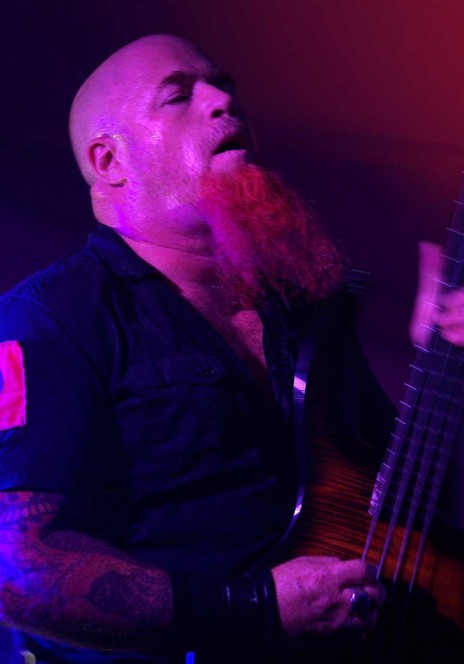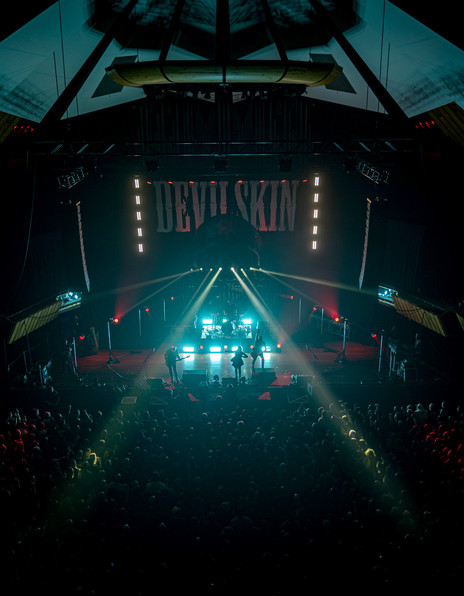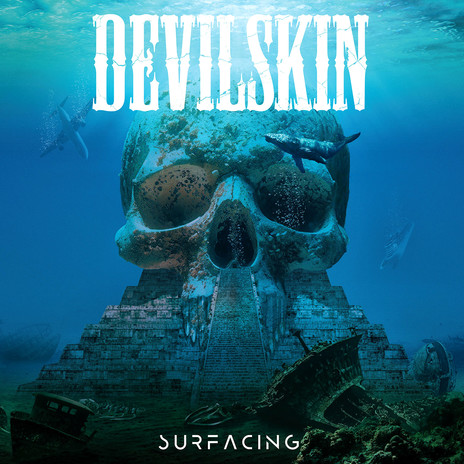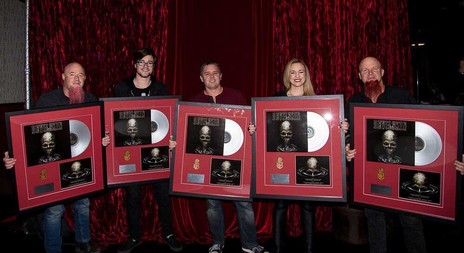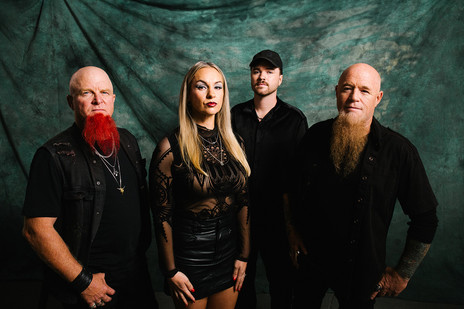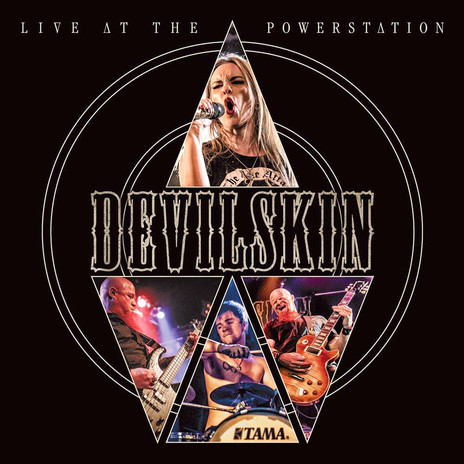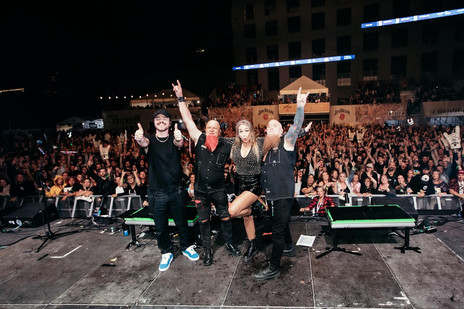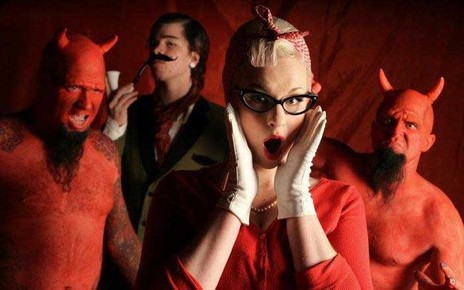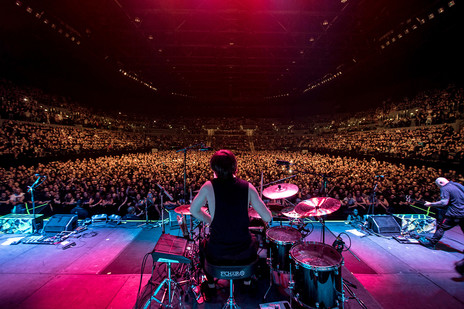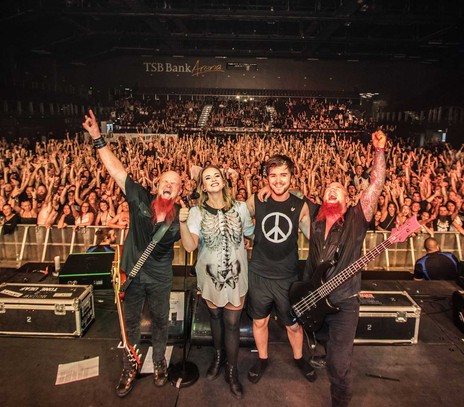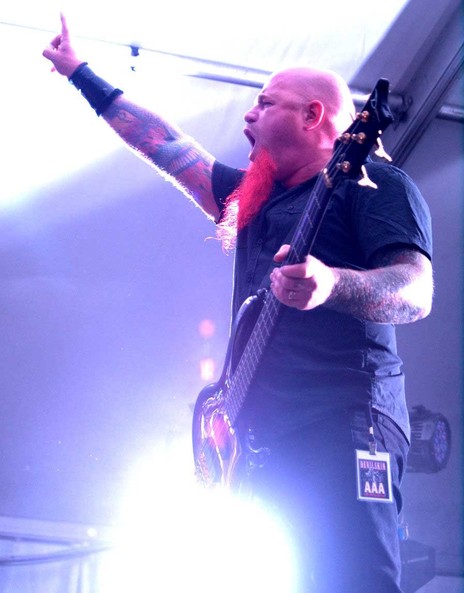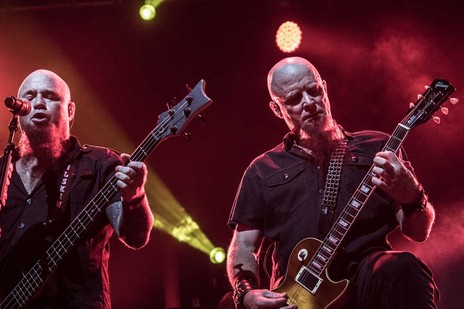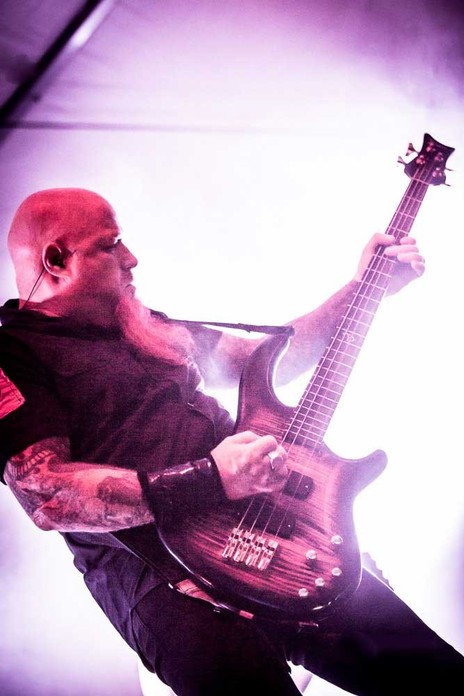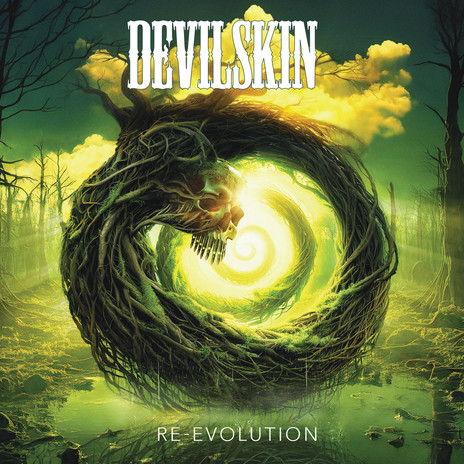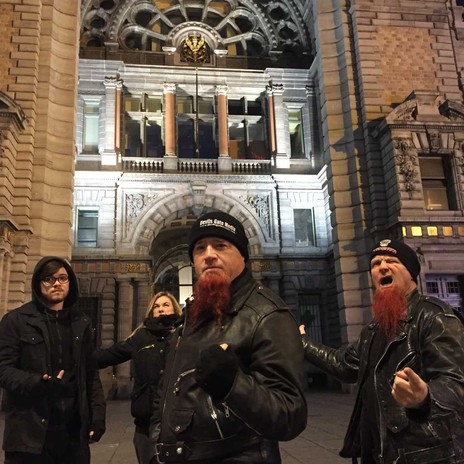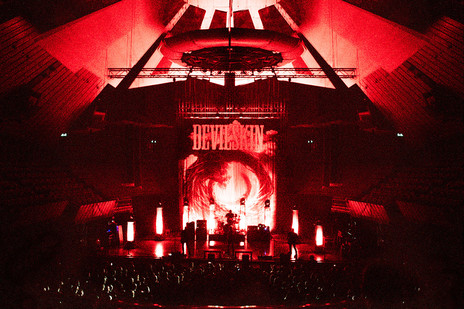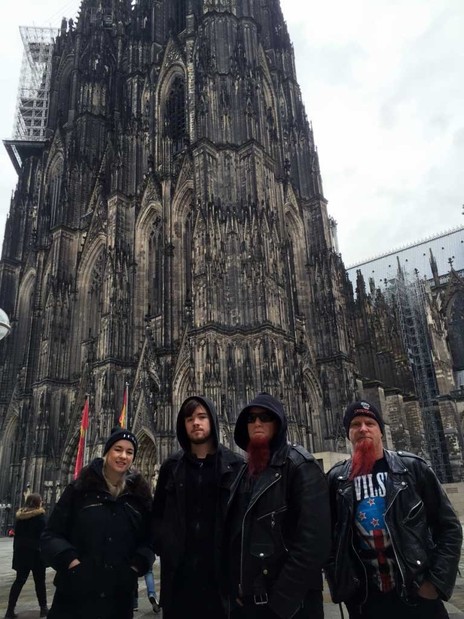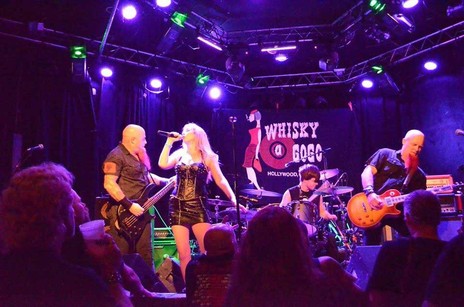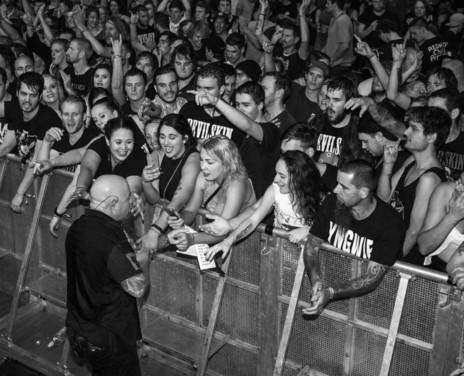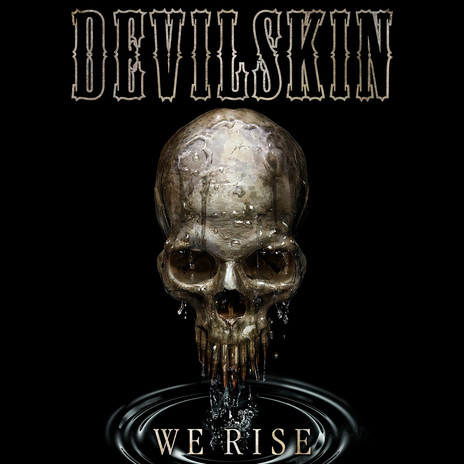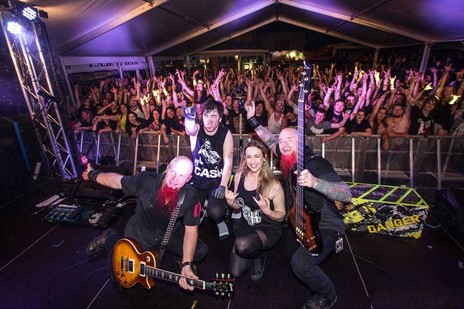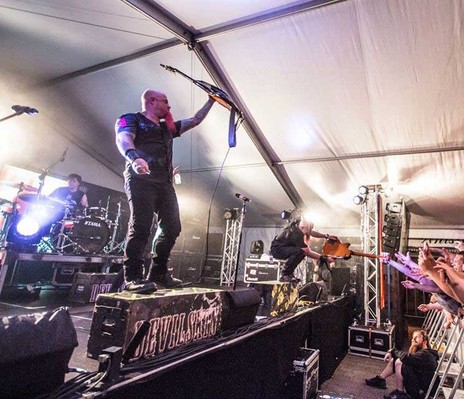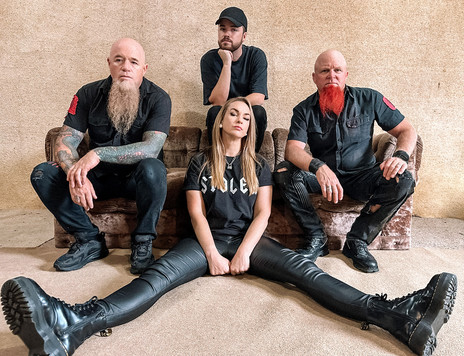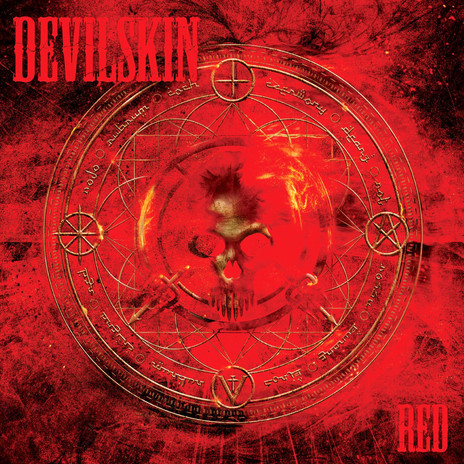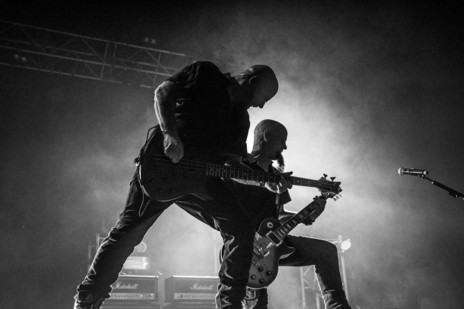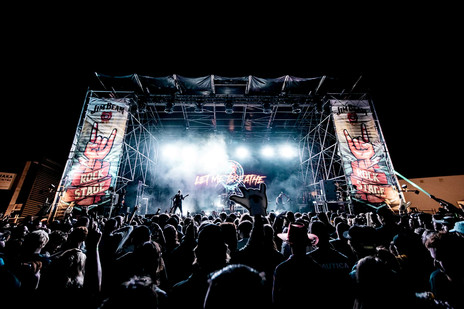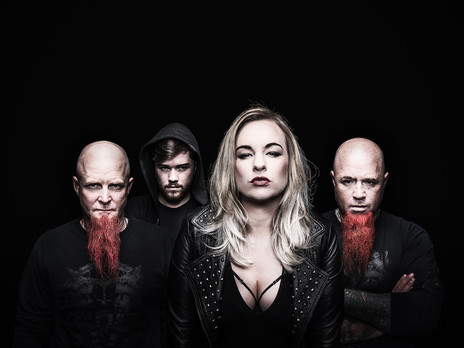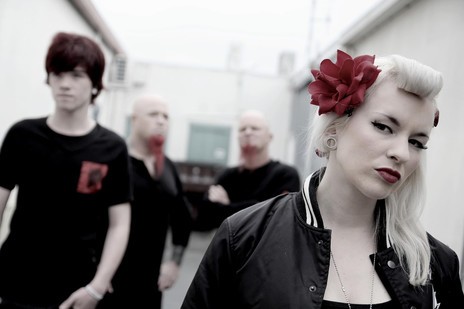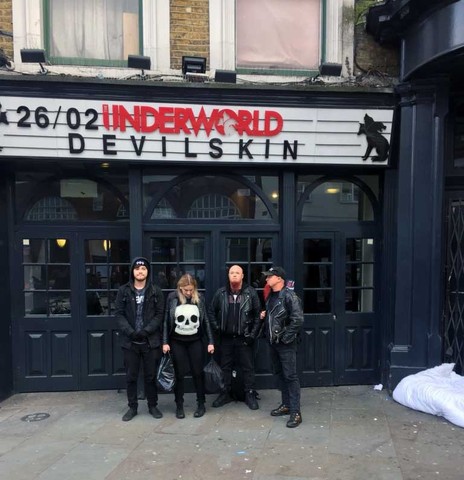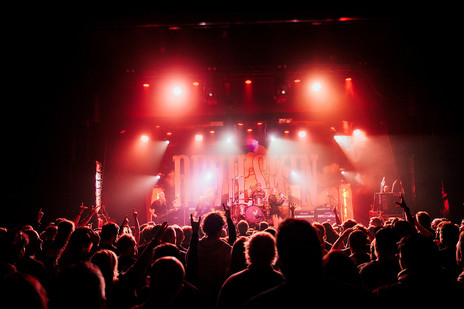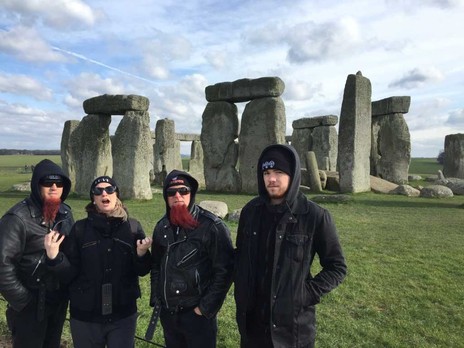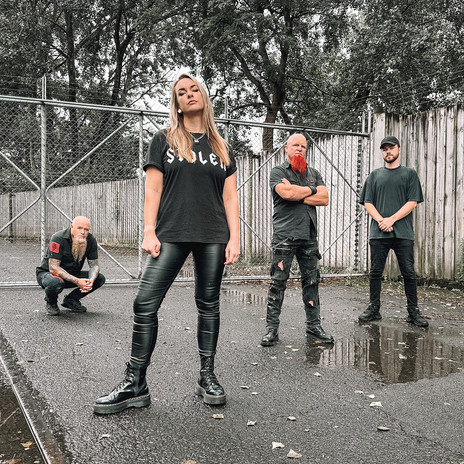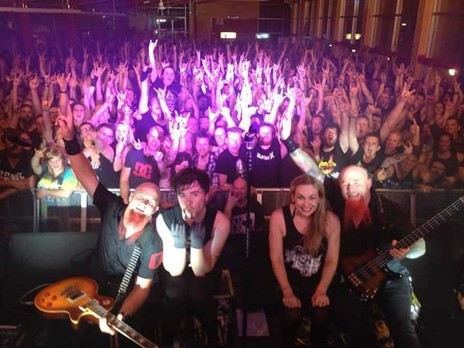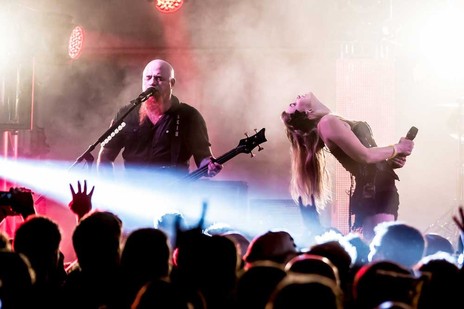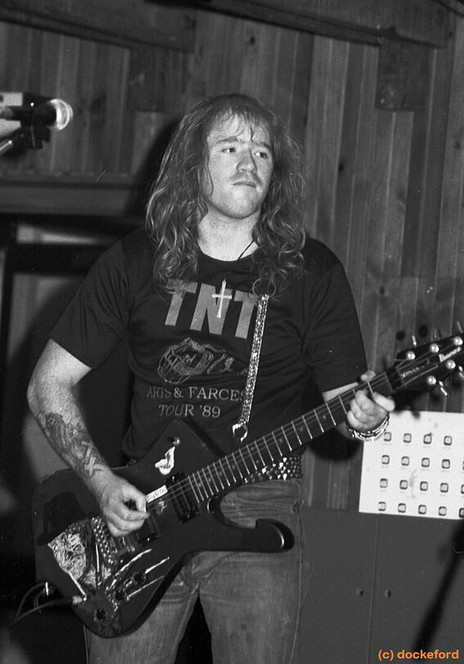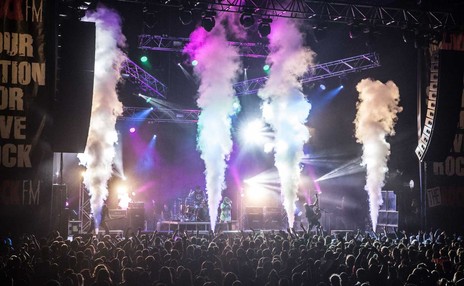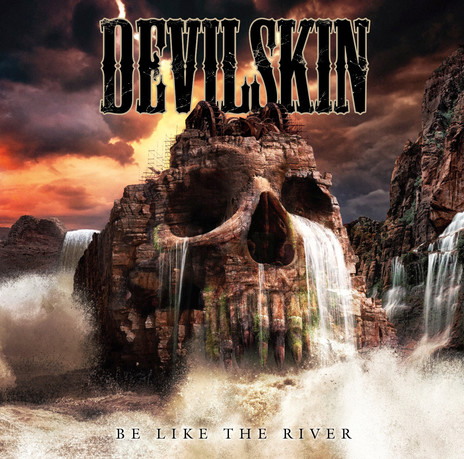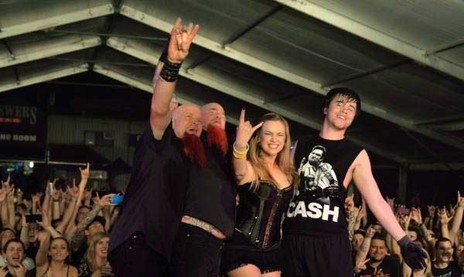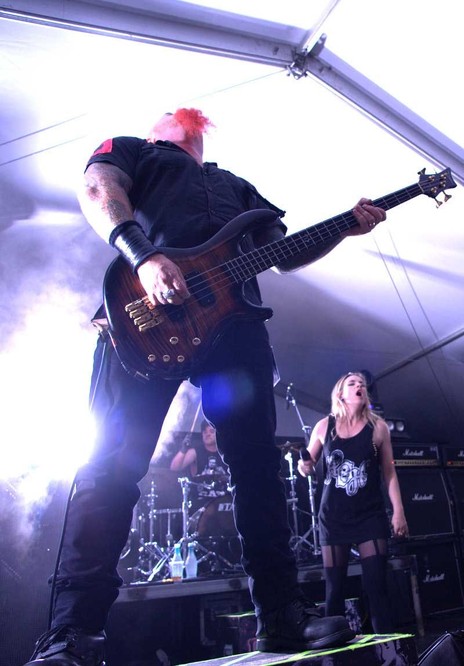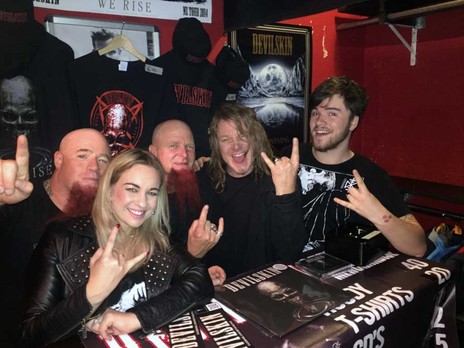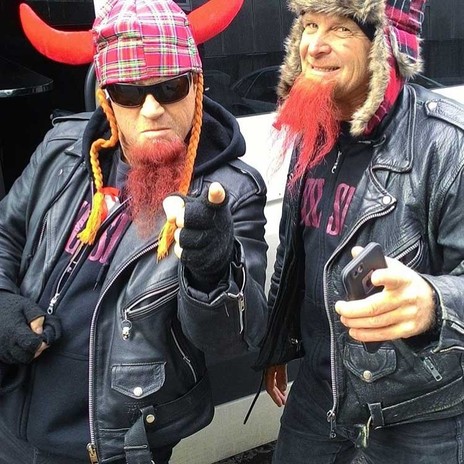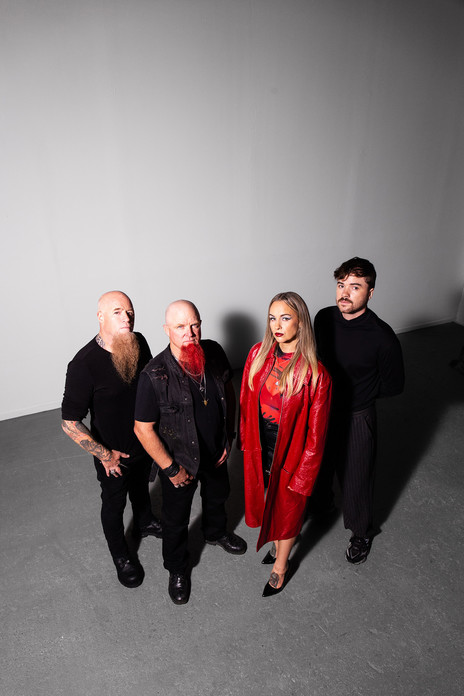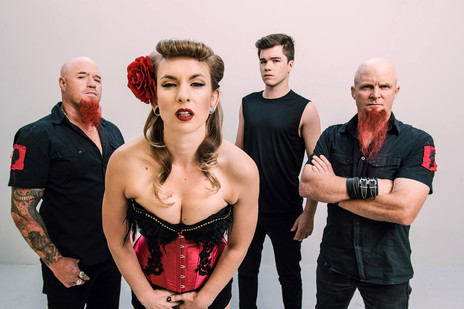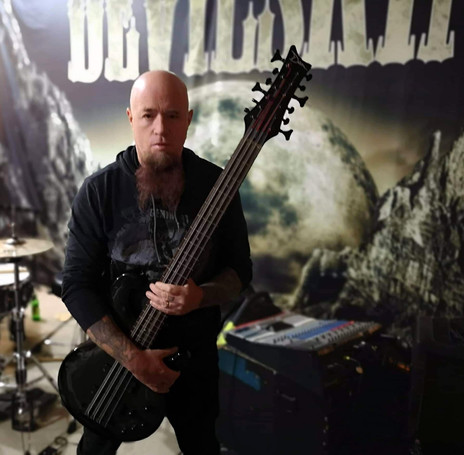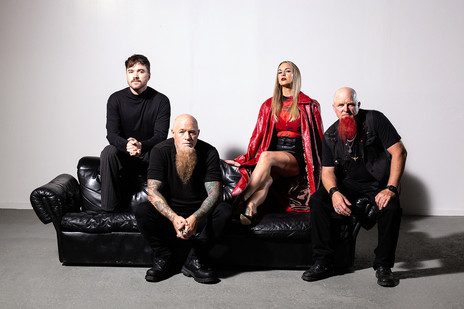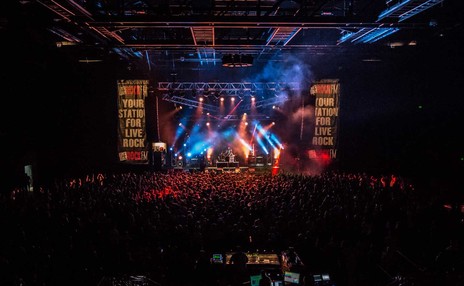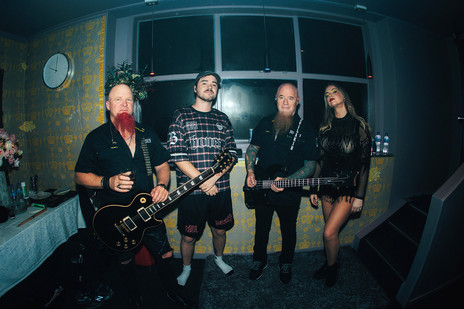“I’m talking to a couple of octogenarians about it and I’m going, ‘Oh, so, I’m in this rock’n’roll band and we just want to shoot a video, and your church and the setting is just so beautiful.’ I say, you know, ‘We’d give a donation to your church, or a koha.’ She says, ‘Oh, okay, dear. Yes, we could look at doing that.’”
Then she asked the name of the band. Wary that divulging a line-up called Devilskin would be filming in their church, Martin told her it was Signs Of Life, a band that had included Devilskin guitarist Nail. “Oh, that’s beautiful, dear,” came the reply. “I’m glad it’s not something terrible.”
As the big black bus with a giant skull and two-foot-high ‘Devilskin’ on its side wended its way to Waingaro on the day of the shoot, Martin received a text message. A few of the curious churchgoers were keen to come and watch the action, would the band mind?
“Oh, my God, we’ve got this bus,” Martin told AudioCulture. “We had to bust it to the local pub, which is miles, to get some rubbish bags and we taped them all over the side of the bus, over the skull and the name.” But the clip was never released, and ‘Fade’ was eventually reshot with Damian Alexander, of Blindspott, directing.
Four albums and 15 years after the Waingaro encounter, Martin, Nail and drummer Nic Martin were sitting at the 2025 Aotearoa Music Awards in Auckland debating whether they should slip away early. They had already lost out to DARTZ in the Best Rock Artist category and had to drive home to Hamilton for an early-morning flight to the deep south. It was the reason singer Jennie Skulander had opted to stay home and grab some extra sleep.
“None of us were drinking because we had to catch a plane,” said Nail. “We’d get back to Hamilton to get, like, four hours of sleep because we had to jump on a plane the next morning and do our first show of our Re-Evolution tour in Invercargill. We’re looking at our watches going, ‘Come on, we’re not winning anything here.’ We were ready to bail.”
At their 2025 music awards win, “The band looked shocked because we were shocked”
But from the stage came the words: “And the winner of the People’s Choice Award is … Devilskin!” The crowd roars, the band members look stunned. The People’s Choice Award, voted by the people from “all artists who have been selected as AMA finalists in the General, Māori, Genre and Breakthrough Artist Award categories.” A diverse list that in 2025 included, among others, Fazerdaze, Lorde, Tami Neilson, Michael Houstoun, and L.A.B. As Paul Martin said on the night, “This is probably the best award that we could win.”
“I’ll tell you what, we looked shocked and that’s because we were shocked,” Nail told AudioCulture. “Yeah, we could not believe it. That, to me, is probably one of the highlights of my career. That’s the New Zealand public that have spoken; that’s the people that have voted for us. We’re stoked with that, man.”
It’s a long way away from where Nail thought his life was heading. Born in Te Awamutu in 1974, Nail, whose real name is Tony Vincent, was on the New Zealand wrestling team as a teenager. He won national and Oceania age group titles, toured the world and was ranked sixth internationally when he was 16. His sights were firmly set on qualifying for the 2000 Olympics in Sydney until he busted his ankle.
“I spent every living moment training and, like, working towards that, but there was an accident at work and a tree landed on me and squashed my leg. So, that kind of put all that on the backburner and I wasn’t able to train or compete or do anything. If that tree hadn’t landed on my fucking leg, I wouldn’t have delved into the guitar the way that I did.”
Nail grew up listening to his two older sisters’ Pink Floyd, Fleetwood Mac and Van Halen records blasting through his bedroom wall. When one of the sisters hooked up with a gigging guitarist, Nail pestered and pestered him until he wheeled his Marshall stack into the lounge and let rip.
“I was probably 12 years old and that was a light-bulb moment for me,” Nail said. “I had very strict parents, so that was being pretty sneaky, you know, to do something like that while my parents weren’t home. I thought it was the coolest thing I’d ever seen.” While still devoting himself to wrestling, he learnt the intros to ‘Smoke On The Water’ and ‘Knockin’ On Heaven’s Door’ on an acoustic guitar one sister had lost interest in.
“I missed some School Cert exams because we were having a jam one day” – Nail
Finding some mates who were into music, he borrowed an electric guitar and amp and sat in. “I actually missed some School Cert exams because we were having a jam one day.” After the accident at work, he got serious about playing guitar but was more involved in managing bands and organising gigs and production.
The dearth of bands in Te Awamutu brought about a move to Hamilton, taking with him the nickname he’d earned as a fencing contractor hammering five-inch nails into posts in the days before nail guns. There, he was managing Cambridge riff-meisters Psyclops and regularly delivering their cassettes and CDs to Paul Martin’s heavy metal radio show The Axe Attack.
Before long, Nail answered an ad in LOOP magazine and started playing in covers bands. One of them, Signs Of Life, evolved into Chuganaut. “We were in Signs Of Life for a long time,” Nail said. “We were a covers band that just wanted to write a bit more originals. We were kind of over the whole covers thing.”
By the time they wound up in 2010, Chuganaut had played the Big Day Out in Auckland, toured in Australia, released the EP Wolf and the album 11:11 One, and opened for Iron Maiden at Mt Smart Stadium. They had also done gigs with Paul Martin’s “dirty little three-man army” World War Four, and a band from Rotorua called Slipping Tongue that featured a powerhouse vocalist by the name of Jennie Skulander.
Although she grew up in Rotorua, Skulander was born in Tokoroa. Her family moved to Rotorua in 1989, when she was four. With a hot-rod-driving, old-school metal fan for a dad, she was raised on Judas Priest, Iron Maiden, Dio, Black Sabbath and Faith No More. In her early teens she discovered the likes of Tool, Snot, Deftones and System Of A Down.
At Rotorua Lakes High School, she joined a vocal group to get out of class and hang with friends. “The music teacher picked up I could sing loud and entered me into competitions,” Skulander said. “I used to go watch the school bands jam in the music room at lunchtime. One day, a band was playing and I jumped on the mic and let out a big growl. I ended up joining that band for a few years after that!”
She won the Rockquest regional finals in Rotorua with Inches Per Second in 2001 and was second in the regional finals the following year as part of Slipping Tongue. “Slipping Tongue was born in 2002, in my seventh form year, but was active for six years. We played lots of shows and tours, recorded EPs and albums, and the biggest band we opened for was [New Yorkers] Coheed and Cambria.”
Following the album My Kingdom Falls in 2008, Slipping Tongue broke up. Skulander put their demise down to “line-up changes and having the wrong people come into the band. Mistakes were made. In the end, it wasn’t Slipping Tongue anymore.” She moved to Auckland but lost her job and headed to Hamilton where her brother lived.
Jennie Skulander joined a vocal group to get out of class and hang with friends
There she ran into Paul Martin, who had been an advocate for Slipping Tongue, and particularly Skulander’s singing, since receiving one of their demos for his Axe Attack show. Hearing she was at a loose end, Martin suggested they look at putting something together. She wasn’t too keen. “I didn’t think I was going to stay in Hamilton. There was drama towards the end of Slipping Tongue, so I wasn’t really into starting a new band,” she said.
Paul Martin has recently been described as the rangatira of New Zealand metal. It’s a title that is well deserved. The son of a postmaster, Martin lived in Taupiri, Urenui and Eltham before the family settled in Wellington. His first instrument was the trumpet.
Heavily influenced by Black Sabbath, Martin taught himself guitar and bass and joined his first band, Tyrant. When they finished, he was invited to join a burgeoning Knightshade, which took him to Hamilton. In the late 1980s, he inherited DJ Johnny Brooks’s The Axe Attack and became a champion of local metal music. Martin’s extensive career is chronicled by Andrew Johnstone elsewhere on AudioCulture.
Hamilton’s heavy metal scene is a close-knit one and when Nail called in to Martin’s for a cup of tea one day in 2009, the two men discussed how they could gently persuade Jennie Skulander to join them. “You know, we didn’t have any great dreams or aspirations or anything like that,” Martin said. “We just wanted to play together.”
Eventually Skulander relented and a date was set. Martin called in solid journeyman drummer Rob McWhannell, who was proficient in all styles of music and had had stints with Waikato stalwarts such as Tim Armstrong and Chris Baillie. Intending to find a bass guitarist if anything eventuated, Martin ‘temporarily’ swapped his guitar for bass.
“We had this one jam and we’re all like, ‘Oh, this is fun’,” he said. “But Jennie’s, ‘So … well, yeah, I don’t really want to go out of town and do any gigs, and I’m definitely not touring or doing anything like that. And don’t think about recording. We’ll just do this.’ It just started pretty organic and just built from there.”
At that first get-together, the band wrote ‘Fade’ and ‘Until You Bleed’ and put lyrics to a riff Nail had demoed that became ‘Little Pills’. All three would appear on Devilskin’s first album and remain present in their set list. Among the covers they jammed early on were ‘Holy Diver’ by Dio, ‘Barracuda’ by Heart, and ‘Cherry Bomb’ by The Runaways.
“We were getting together once a week at Rob’s place and we’d hash out the songs,” Nail said. “Paul had a laptop there and we would record, like, basic recordings, but recordings that we could take home and critique the music. We were looking for opportunities, and then we said, ‘Hey, Jennie, we’ve got an opportunity to do this gig. Are you interested?’”
They needed a name. “Let’s be Devilgun,” said Martin. “Everyone went, ‘That’s stupid.’
But first, they needed a name. After lots of toing and froing, Martin proposed Devilgun. “I went, ‘Hey, you know, there’s the devil sign and there’s the gun sign, let’s be Devilgun,’” he said. “Everyone went, ‘That’s stupid.’ And then I went, ‘Oh, come on, Devilgun, man, make it one word. It’d be really cool.’ And everyone’s, ‘Nah, it’s really dumb.’”
Later, Martin was reading some of Skulander’s lyrics about a doomed relationship where the man has two personalities. “I thought, ‘Wow, it’s kind of like he’s putting on a different skin,’ and I went, ‘How about Devilskin?’ And they went, ‘No, that’s dumb, as well.’ I mean, I just stuck with it, and it just happened.”
Devilskin played their first show at Martin’s annual Gemini Party on June 6, 2010. That was followed by a tattoo expo in New Plymouth, shows at Hamilton’s metal venue Axces Bar, and gigs further afield in Napier, the South Island, and even a tattoo show in Brisbane.
Right from the off it was all about making a statement. “You know, we’d get out of town, and we’d want to make the room look special, so we’d get into the bars, and we had all this red, shiny material that we’d drape all around the stage,” Martin said. “You know, just to make it look special, like, ‘Wow, what’s going on here?’
“We took time to build a show right from the beginning. And when people started turning up, I was like, ‘Fucking cool, man, people are coming. Okay, let’s put the money into the production.’ And so, the PA was always getting bigger and better and we’re always striving to get better sound, better production, more lights. You know, we had smoke machines to operate with our feet and pinspots that we used to hang everywhere. We didn’t want to just be another pub band or another band in the corner.”
On the eve of Devilskin opening for New Zealand death metal merchants Sinate in Tauranga in July 2011, drummer Rob McWhannell was scheduled for a shoulder operation following a motorcycle accident. In need of a replacement, Martin looked no further than his garage and his 15-year-old son Nic.
Born in December 1995, Nic Martin had been bashing on boxes from the age of six. Surrounded by music through his father’s radio show and band projects, it was hearing Avenged Sevenfold’s City Of Evil on the car stereo that had him zero in on the drums. He told AudioCulture, “I was about 10 or 11 years old, and I was just like, ‘Whatever that guy is doing, I want to figure out how to do it. I signed up for drum lessons at school and asked Dad if he could borrow his friend’s drum kit.”
Drummer
Nic Martin started bashing on boxes from the age of six
Paul Martin: “Nic’s like, ‘How does this work?’ And I said, ‘Well, you sit here and you go like this.’ ‘Okay, okay, I’ve got it. Move over, Dad. Yeah, I’ve got it, off you go.’ He just loved it and didn’t stop. Hours and hours and hours. Pissed our neighbour right off, because we sort of share a garage roof.”
Nail: “I used to go to Paul’s all the time. I could hear Nic practising out in the shed, and I’d just sit there and just listen and I’d go, ‘He’s a fucking beast.’ You know, he was a weapon. And then, you know, when Rob had his surgery and then Nic came in and filled in for him, it was night and day.”
One gig turned into four gigs, then five, and it was decided to have Nic join permanently. “That was a massive shock,” he said. “It’s a massive gamble, you know, to take a chance on a teenager.” Rob McWhannell took it in his stride and even occasionally roadied for the band. He passed away from cancer in 2018.
In 2012, Devilskin released the singles and self-financed videos ‘Little Pills’ and ‘Never See The Light’, which made a splash on The Rock radio station and online, but it was becoming obvious that they needed management. A fan of the band, Jerry Lloyd, suggested they contact his ex-boss, James Southgate, the former managing director of Warner Music NZ who had signed The Feelers before becoming their manager.
“So, we paid for him to come down,” Paul Martin said. “We brought him down to Hamilton for a night and we put on a big night at Axces Bar. We’d pay for him to have a swanky room for the night, come down to see us, you know, and he was blown away. And the next day we had a meeting and he’s like, ‘Yeah, I’ll manage you guys.’”
Southgate’s stewardship immediately paid dividends. “Everything was based in Auckland, and we were a bogan band from the Waikato, so we were getting nothing. Same song, with his name at the bottom of the application form, boom, doors opened, and then, you know, everything just exponentially kind of grew from that. Having a little bit of funding in those days made a hell of a difference. Still does.”
Although there was never an issue with having an under-age band member when Devilskin played in New Zealand, there was trouble on an early trip to Australia when they played Surfers Paradise as part of a multi-band bill. Security refused to let Nic Martin into the venue for sound check or the gig.
“The security guard wasn’t having a bar of it,” Nic Martin said. “This turned into probably a four-or-five-hour stand-off outside the venue. They just were not budging. They’re saying, ‘I’m not saying he can’t play the gig, he just can’t be inside!’ We even had two drummers from the other bands coming in and saying, ‘If you guys get stuck, do you want me to learn the songs?’”
Common sense finally prevailed when a Gold Coast friend who knew the promoter gave him a call. The young drummer could walk to the stage escorted by a security guard while Devilskin’s intro music played, do the show, then leave with the security guard immediately after the last cymbal crash. “I wasn’t even allowed to pack up my own stuff. I was barely allowed to towel off.”
Devilskin’s debut album ‘We Rise’ was released in July 2014, debuting at No.1
Preceded by promotional single ‘Start A Revolution’, Devilskin’s debut album We Rise was released in July 2014, debuting at No.1 and remaining there for three weeks. Recorded at York Street and produced by Clint Murphy, who had produced albums for The Bleeders and Goldenhorse, We Rise was certified platinum early the following year and would eventually go double platinum.
The record began a trend for subsequent Devilskin albums. Firstly, there was the striking cover art of Barny Bewick, then the habit of each album’s title being the name of a song on the next album. But that one started by accident when there was too much material for We Rise.
“We had demo’d 20-odd songs and we had to get it down to 14,” Paul Martin said. “ ‘We Rise’ didn’t make the cut for the first album. And it was the same with ‘Be Like The River’, the song. We all loved it and wanted it on the second album [Be Like The River], but it just didn’t fit at the time. Yeah, it’s weird how it has worked out.”
Live At The Powerstation was released on DVD and CD in late 2014 and Devilskin was invited to support Guns N’ Roses guitarist Slash on his New Zealand tour. “We did those first couple of shows with Slash in Hamilton and then Wellington,” Nail said, “and then I think [in 2019] they were touring with Slash and Myles Kennedy and The Conspirators, and they contacted us and wanted to know if we wanted to do the New Zealand tour and the Australian tour. I’m, like, playing with one of my heroes every night, hanging out in airports and the whole deal. Pretty surreal.”
In April 2015, Devilskin played at the Whisky A Go Go in West Hollywood, on their way to showcase performances in the UK. While there, they began recording with Clint Murphy at his new base at Modern World Studios in the Cotswolds. Back home, they opened for Motley Crue and Alice Cooper at Spark Arena – the big black bus being towed in after breaking down on the motorway – and released the single ‘Mountain’.
With We Rise getting released in the UK and Europe, Devilskin headlined an 11-date tour there in early 2016 before reconvening with Murphy at Modern World to complete their second album. “It was crazy because the accommodation was on site, these dodgy rooms built on the side of this factory,” Martin said. “And the factory goes 24/7, so there’s machines going all night, bang, bang, bang.
“We’re doing 12 hours plus in the studio and trying to sleep and, ‘Oh, shit!’ We sampled some of that noise from our hallway and stuck it on the album so you can hear it before a track. But it was really cool to be immersed in making a studio album for two weeks. They had a great little kebab cart that used to come into the middle of nowhere. Yeah, fun, and it was only, like, a 25-minute walk to The Snooty Fox.”
Released worldwide in November 2016, Be Like The River spent a week at No.1 on the NZ Music Charts and, a year later, was awarded the Tui for Best Rock Artist at the NZ Music Awards. Devilskin hit the road in New Zealand and Australia with US rockers Halestorm.
In 2017, they toured Germany, performed at the Download Festival in Donnington, and toured the UK with Canadian punk-metal unit Sumo Cyco. The following year, they were invited by Halestorm to play support on their European tour – 18 shows in 25 days.
“The first show was, like, I think it was 3,500 capacity, sold out,” Nail recalled. “That was in the Netherlands, and then it just went on for the next month. You really do get caught up in a tour bubble because every night’s Saturday night, and you’re partying like every night’s Saturday night. It’s hard to know what day of the week it is, or what town or city you’re in, or what country, because it’s all happening so, so fast. And that is a very bizarre experience.”
Although its corresponding co-headline tour of Europe and the UK with Auckland band Like A Storm was scuttled by COVID-19 lockdowns, third album RED was released in April 2020. Peaking at No.2, it was produced by Greg Have – whose credits included producing the Manic Street Preachers and former Spice Girl Mel C – and recorded at Roundhead Studios in Auckland.
“We’d put all our chips into that album and the release of that,” Nic Martin said. “We’d booked a 30-date headline tour across the UK and Europe to celebrate the album. So, album release April 3rd, 2020, flights to the UK, April 6th or 7th, 2020. Then March 25th was day one of lockdown.
“So, it very, very quickly went from, ‘Oh, this COVID thing, I don’t know if we’re going to be able to do Italy. Ooh, hang on, Germany’s not looking so great. Oh, north Germany’s alright. Oh, hang on, Europe’s not looking great. Maybe we’ll just do the UK. Hey, guys, we’re not going to be able to send CDs to these people who have pre-ordered down the road!’ It was so sudden. We were all kind of banking on that album being our make-or-break international opportunity.”
At least international fans could still connect with the band online. By this stage, Devilskin had released 11 official video clips. Besides showing the evolution of the band, the films are a record of Nic Martin progressing from his teens into manhood. It was not uncommon for him to be asked at gigs when he replaced the kid in the band. He was the kid in the band!
Unable to leave the country in 2021, Devilskin continued their long association with the Homegrown Festival and undertook another successful tour of New Zealand, this time with Kora. The following year they at least got to return to Australia.
When it came time to record again, they were after something different. After a session with another outfit, Nail alerted his bandmates to Dave Rhodes, the former Stylus drummer/producer whose CV included Six60, The Topp Twins, Blindspott, Head Like A Hole, and his dad Alan Rhodes’s Hamilton County Bluegrass Band. “Nail goes, ‘Man, this guy’s really cool,’” Paul Martin said. “We got to meet him, got to hang with him and, yeah, we just got on like a house on fire.”
Rhodes produced the single ‘Let Me Breathe’, released mid-2023, and the EP Surfacing, 2024, to celebrate the 10th anniversary of debut album We Rise. Recorded again at Roundhead, the EP featured covers ‘Barracuda’ and ‘Holy Diver’ from those first jam sessions when the name Devilskin hadn’t even been thought of. Fourth album Re-Evolution was released in 2025, produced by Rhodes at Parachute Studios in Auckland. It was another New Zealand chart topper.
With the AMA People’s Choice Award in their back pocket, Devilskin set out on another sold-out New Zealand tour in June 2025 with a proven philosophy. “It was always about putting on a good show,” Paul Martin said. “We want people to remember us, hence dressing up the stage.
“I’ve been playing in bands since I was 17, but never to people, you know. Never bands that people particularly wanted to come see, especially women in the audience. Now we’ve got such a cross-section of people and, honestly, we often get three generations of people there. I absolutely love doing the bigger rooms where we can have all-ages shows because it just fills your heart, and the energy that they bring to it.”
Now with Devilskin looking to re-earn their stripes in the northern hemisphere after the judder bar that was COVID, it seems only apt to adapt the title of the new Spinal Tap movie – Devilskin: The Beginning Continues.
